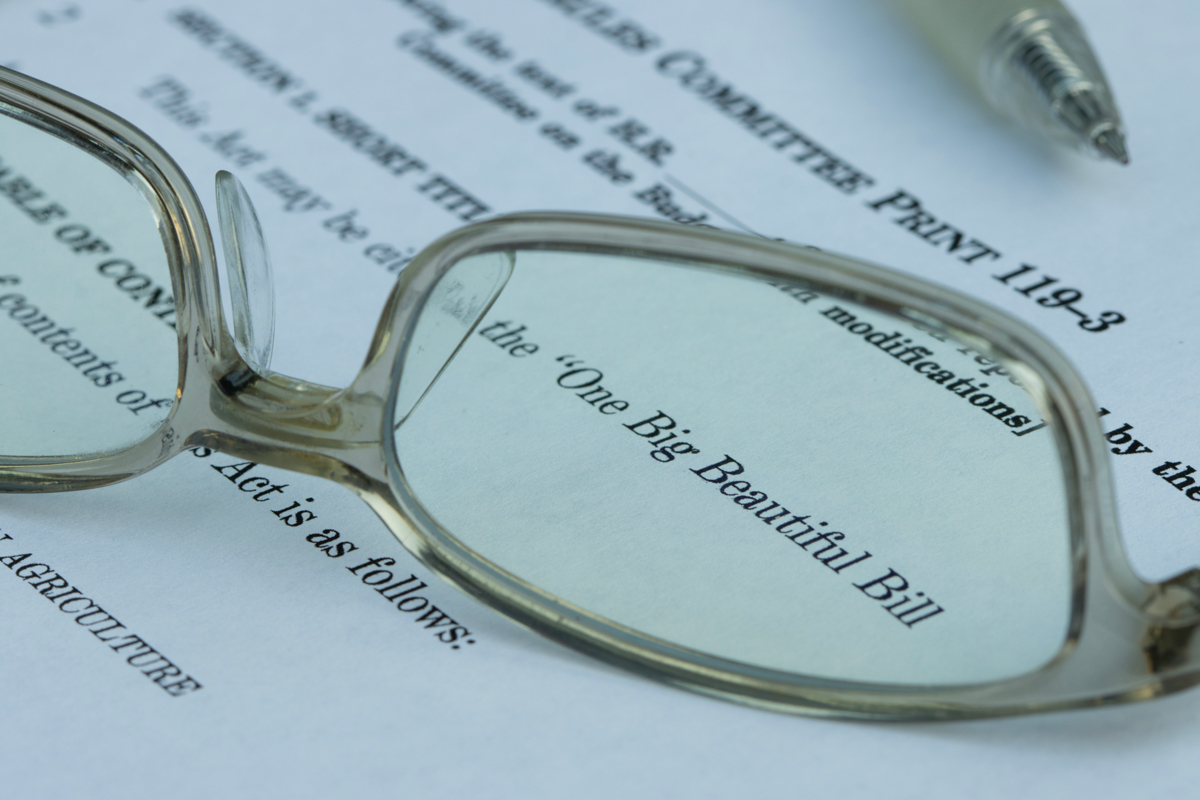By Scott Emery and Jack Reinseth, Law Clerk
On July 4, 2025, the One Big Beautiful Bill Act (OBBBA) became law as President Trump penned the final required signature. The OBBBA extends several provisions of the Tax Cuts and Jobs Act of 2017 (TCJA) and includes other changes affecting the taxes of individuals and businesses. Below are summaries of selected tax law provisions.
Highlights for Individual Taxpayers
These provisions affect income taxes, deductions, and exemptions for individuals and families, beginning as early as the 2025 tax year.
- Increase in Estate and Gift Tax Exemption: The estate and gift tax exclusion is increased to $15 million per decedent starting in 2026, indexed for inflation thereafter. Portability for a surviving spouse remains available.
- Temporary Increase in the SALT Deduction: For tax years 2025 through 2029, the OBBBA raises the itemized deduction cap for state and local tax (SALT) from $10,000 to $40,000 with an annual one percent increase in the cap. The $40,000 cap is reduced by 30% of the amount a taxpayer’s modified adjusted gross income exceeds $500,000, eventually phasing the deduction to $10,000. In 2030, the SALT deduction cap reverts to $10,000 for all taxpayers.
- Permanent Increase in Standard Deduction: The standard federal taxable income deduction increases from $15,000 to $15,750 for individuals, and from $30,000 to $31,500 for married couples filing jointly starting in 2025, indexed for inflation.
- Temporary Deduction for Tips and Overtime: Instead of income exclusion, the OBBBA allows an above-the-line deduction of up to $25,000 for tip income reported on a tax return. This deduction begins to phase out when a taxpayer’s modified adjusted gross income exceeds $150,000 for single taxpayers ($300,000 for married filing jointly). It applies only to tips in industries where tipping is customary and does not apply to those earned in specific service trades or businesses (e.g., accounting, law, health).
A separate deduction is allowed for overtime pay under Section 7 of the Fair Labor Standards Act of 1938. This deduction is limited to $12,500 for single taxpayers ($25,000 for married couples filing jointly), with the same phase-out thresholds.
Both deductions are available to all taxpayers starting in 2025, regardless of whether they itemize, but expire after tax year 2028.
- Other Provisions for Individuals
-
- Permanently eliminates the deduction for miscellaneous itemized expenses.
- For tax years 2025 – 2028, allows a deduction for up to $10,000 of interest on new car loans on U.S.-assembled vehicles, subject to income phase-outs ($100,000 single/$200,000 joint). Available to itemizers and nonitemizers.
- Beginning in tax year 2026, permanently allows a nonitemizer charitable deduction up to $1,000 for single filers ($2,000 for joint).
Key Provisions for Businesses
The OBBA introduces a number of tax changes aimed at business owners, including expanded deductions and permanent extensions of prior incentives.
- Bonus Depreciation for Certain Property and Equipment: The OBBBA permanently reinstates the 100% bonus depreciation provisions by allowing the 100% first-year depreciation deduction for qualified property acquired or placed in service on or after January 19, 2025.
- Expansion of the Qualified Business Income Deduction – IRC Section 199A: The Section 199A qualified business income (QBI) deduction is expanded. The 20% QBI deduction is made permanent and a new $400 deduction (indexed for inflation) is also introduced for taxpayers with at least $1,000 in qualified business income from certain trades or businesses. The phaseout thresholds are increased to $150,000 for joint filers and $75,000 for single filers.
- Permanent Research and Development Costs Deductions: The OBBBA reinstates and makes permanent the deduction for domestic research and development expenditures incurred after 2024. Small businesses may elect to deduct remaining capitalized expenses in 2025.
- Other Provisions for Businesses
- The maximum IRC section 179 deduction for small businesses increases to $2.5 million, with a phaseout threshold increased to $4 million.
- The OBBBA amends IRC section 1202 to allow a partial exclusion from gross income for gains on qualified small business stock (QBSB) acquired after July 4, 2025. The exclusion applies to 50% of the gain for stock held at least three years, 75% for stock held at least four years, and 100% for stock held at least five years. The maximum gain exclusion per shareholder is increased to the greater of $15 million or 10 times the shareholder’s basis, and the gross asset limit increases to $75 million. Both limits are indexed for inflation starting in 2027.
The OBBBA introduces wide-ranging changes that may impact your tax strategy. While additional IRS guidance is expected, now is a good time to assess how the new provisions may affect you or your business. If you’d like to discuss planning opportunities under the new law, we’re here to help.
The purpose of this article is merely to provide general information and should not be construed as legal advice.


